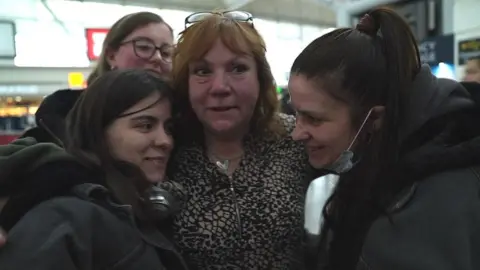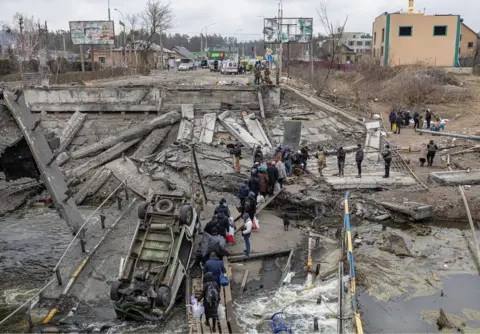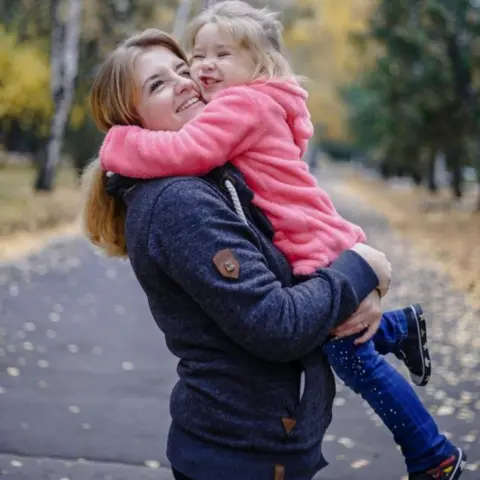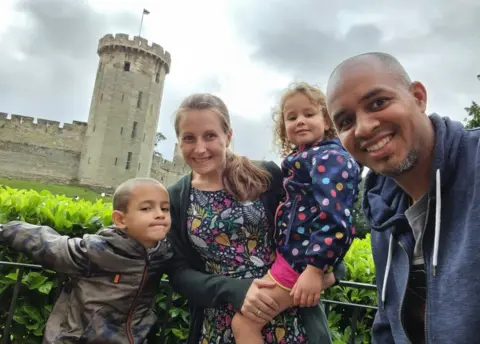Ukraine: 'I am safe, my daughter is safe, that's the main thing'
 BBC
BBC"That's her, isn't it?" Clare Maddox nervously asked her daughter, Sophia, as they waited by the arrivals gates at Stansted Airport. They were looking out for a mother and daughter - two refugees who were among the first to arrive in the UK under the government's Homes for Ukraine scheme.
It had been 11 years since they last saw Diana Sachavo in the flesh. She had visited the UK, aged 10. Diana had come over with the help of the charity Chernobyl Children's Lifeline and stayed with the Clare and Sophia at their house in Billericay, Essex. Afterwards, they had stayed in touch. Now she was returning - alongside her mother - this time as a refugee.
"I'm so glad you are here," Clare told them, as she was introduced to Diana's mum, Olena, for the first time. Their flight from Lithuania had just landed and Clare tearfully hugged both women, not letting them go.
Diana and Olena had to leave their home in the town of Irpin. It has been heavily bombed by Russia. They first travelled to Ukraine's capital, Kyiv, then to the western city of Lviv, before fleeing for Poland, then Lithuania.
They arrived in the UK as part of the Homes for Ukraine scheme, which launched two weeks ago. Yet latest figures suggest they are among the lucky ones. Just 2,700 visas have so far been granted under the scheme. The number of applications has already passed 28,000.
 Reuters
ReutersAs part of the scheme, Ukrainian families who are escaping the war - like the Sachavos - can come to the UK for up to three years and receive access to healthcare and benefits, provided a named individual agrees to put them up for a minimum of six months.
Those with citizenship or settled status are able to bring their family over to stay under a separate Home Office scheme.
"I think they are very brave making that really terrifying journey," Clare told the BBC. "I can't tell them how incredibly sad I am that they have had to make that journey. Hopefully I can just make their lives a little bit better than they have just been experiencing."
"We had to find the courage to choose the safest moment for us to escape the shelling," Olena added. "I am safe and my daughter is safe and that is the main thing. I am extremely grateful to you, Clare, and to all the people who have been so kind to us."
Yet most families who have registered for the scheme are still waiting for news. Many are increasingly frustrated at how slow the process is going.
Garry Taylor, a project manager from Southend-on-Sea, made contact with Yuliia Chernovil and her seven-year-old daughter Alisa via social media a day after the UK scheme was launched.
The mother and daughter had to flee the eastern region of Donetsk, heading for Lviv. They are now living in a refugee camp in Warsaw, across the border in Poland, with rows of camp beds lined up next to each other.
 Yuliia Chernovil
Yuliia Chernovil With two children of his own, Garry was keen to help out and share his house, with its large garden and trampoline.
But two weeks on, his would-be guests are still stuck in Poland waiting for a passport for Alisa to be issued. "The process hasn't been thought through," he says. "It's embarrassing having to ask every day: 'Have you had any news on your visa'?"
"You've got countries across Europe welcoming people with open arms. I've seen some leaflets in Poland saying: 'Don't worry about the formalities, we'll worry about those afterwards'. Yet, you've got all of this red tape that we seem to have created here."

War in Ukraine: More coverage
- LIVE: Latest updates from Ukraine
- SURVIVAL: 'They won't tell me how many bullets were in me'
- SHOOTING: Does video show Ukrainian war crime?
- READ MORE: Full coverage of the crisis

After we asked the government about the case, Garry says Yuliia received an email from the Home Office telling her she needed to upload more photos of her passport. They have now had to make another appointment at the visa centre in Poland.
Many hosts in England, like Garry, are getting much of their information from groups popping up on social media, where there is still a steady stream of both people offering accommodation and those seeking a place to say.
Some report frustration with the time it is taking to issue visas and the lack of updates. There are also reports of problems uploading documents to the scheme's portal, as Garry discovered.
Scotland and Wales have taken a different approach, acting as so-called "super sponsors". This means any Ukrainian can apply without a named sponsor and they will initially be given temporary accommodation before a home is found for them.
 Garry Taylor
Garry TaylorThere has been criticism of the scheme since it was launched and charities have said the process in England "is just too difficult" for those fleeing Ukraine. They have called for the UK to stop requiring visas for those fleeing Ukraine.
Downing Street meanwhile has said the Home Office has made the process quicker and easier - including making the visa form shorter, and allowing valid passport holders to apply online and complete biometric checks in the UK.
But refugees minister Lord Harrington acknowledged more needed to be done. "We are starting to see progress because of changes the Home Office made to streamline the visa process and put additional resources into the system.
"However, we need to do more and will be making further improvements to bring people to the UK as quickly as possible. I look forward to welcoming more families and ensuring they have the support they need when they arrive."
Update: A short time after this story was published, Yuliia and her daughter received the final documents they needed to be able to travel to the UK.
Additional reporting by NJ Convery.
